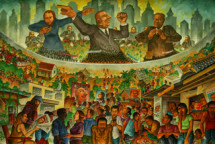They were accused of being a heretical religious group and of preparing a seditious attack against the Indonesian State. Their claim of existence as a group of farmers trying to escape from food dependence by farming on their own land was lost from public attention.
This situation has raised many questions, upon which this study is based. This study finds that Gafatar is an emancipatory movement that is strongly connected with the ideology of Millah Abraham, which is based on values of the universality of humanity, egalitarianism and social justice. Their attempt to build an egalitarian, self-sufficient, communal agrarian life was a culmination of the manifestation of these values, before they were forcefully dispersed. Because of the strong religious reaction towards this movement, the rejection and forceful dispersal of Gafatar can rather be seen as a kind of moral panic by the dominant religious and political establishment, rather than a dislike of their rural life practices as such.
What becomes more convincing, however, is that broad er authoritarian forces were directed at this movement, as shown by the alignment of the state apparatus (particularly military and police), mass media representation, and mainstream/orthodox Islam. Populist rhetoric was the main discursive weapon justifying the forced dissolution of the new settlements and dispersal of the members. This paper starts by summarizing key concepts and teachings of Millah Abraham as the core ideology of the Gafatar movement. It then explains the manifestations of these teachings in the leaders’ vision of egalitarian rural settlements through self-sufficient communal life, the steps taken to realise this vision in newly-established communities in Kalimantan, and the series of authoritarian practices leading to their collapse.
This paper was presented at the Emancipatory Rural Politics Initiative (ERPI) 2018 Conference: "Authoritarian Populism and the Rural World"

